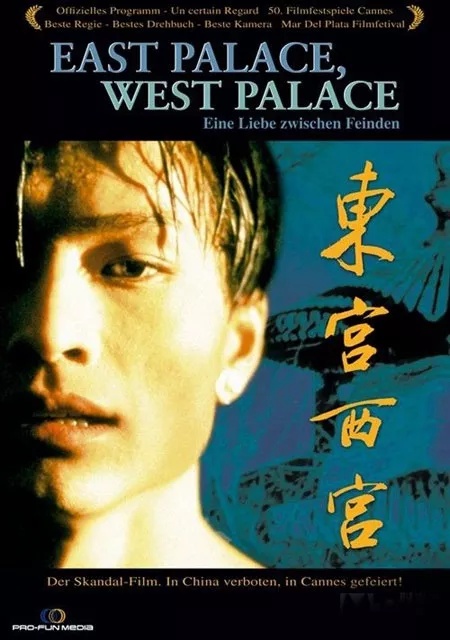EAST PALACE, WEST PALACE (DONG GONG XI GONG)
(director/writer: Zhang Yuan; screenwriter: Wang Xiaobo; cinematographer: Jian Zhang; editor: Vincent Levy; music: Xiang Min; cast: Hu Jun (Xiao Shi), Si Han (A-Lan), Jing Ye (A-Lan as a youth), Ma Wen (A-Lan as a boy), Zhao Wei (Female Student), Liu Yu Xiao (Female Thief), Lu Rong (A-Lan’s mother); Runtime: 94; MPAA Rating: NR; producers: Zhang Yuan, Christophe Jung, Christophe Ménager; Strand Releasing/Amazon/Fortissimo Films; 1996-China-in Mandarin with English subtitles)
“The first mainland Chinese drama to deal openly with the subject of homosexuality.”
Reviewed by Dennis Schwartz
East Palace, West Palace,” takes its title from the public toilets that flank the Forbidden Palace in Beijing, where gay men cruise. It’s billed as the first mainland Chinese drama to deal openly with the subject of homosexuality. The film was originally developed as a two-character stage play. Indie Chinese director/writer/producer Zhang Yuan (“Sons”/”Beijing Bastards”) bases the film he co-authors with Wang Xiaobo on the challenging experience of being gay in the repressed country of China (where homosexuality is not illegal, but is not tolerated). The Chinese government censored the film, but Zhang’s friends smuggled it out of the country so it could be shown at the 1997 Cannes film festival. As a result Zhang’s passport was confiscated when he returned to China from Hong Kong, The punitive Beijing authorities also forced the withdrawal of fellow Chinese director Zhang Yimou’s new movie, “Stay Cool,” from competition at Cannes.
After a roundup of gay men in a park adjacent to the Forbidden Palace in Beijing, the effeminate looking married writer A-Lan (Si Han) is unapologetic about being gay as he’s questioned all night at the police station by the homophobic arresting police officer Xiao Shi (Hu Jun). During this long session there’s flashbacks to A-Lan’s childhood and youth, and he’s coerced into telling his life story. Though sent away by his family for cures, A-Lan said he always knew he was gay and is proud of it. During the questioning the gay man makes it clear he wants respect and to be understood, but as the questioning continues it becomes increasingly ugly. A-Lan sees how his questioner is so sexually confused in his thinking and that he’s a possible closet gay, as he suddenly kissing him and leaves him in shock.
During this night-long confessional, a dueling match of opposing philosophies occurs, as the ground covered includes being gay, coming out, S&M, and transvestism.
It’s well acted, and not that stagey, and is arresting since it’s set in an intolerant place like China where the character-driven story delivers its forceful political and humanistic message without backing off even an inch.

REVIEWED ON 7/8/2020 GRADE: B